Better known scientifically as Nymphicus hollandicus, the cockatiel is among the most popular pet bird species out there. Not surprising, as these small cockatoos make a great addition to the family! If you just got yours or are looking to get one, you might be asking yourself: how long do cockatiels live?
The answer to this question depends on many factors. Let’s go into the lifespan of a cockatiel and how to make sure yours makes it to a ripe old age.
This post contains affiliate links. If you make a purchase, a small percentage will go directly to Psittacology at no additional cost to you. Thank you for supporting Psittacology!
How long do cockatiels live in the wild?
As discussed in the article about the life of a cockatiel in the wild, the life of a wild cockatiel is not always easy. The lands they inhabit can be harsh and many flocks need to be nomadic in order to find the food and water they need to survive.
Apart from being swift fliers and their grey camouflage coloration, cockatiels don’t really have any defense against natural predators like raptors.
Despite the above, cockatiels can actually make it quite long in the wild if circumstances are favorable. The lifespan of a cockatiel in the wild is 10-15 years, although it can be much less if the bird is unlucky. Many chicks don’t make it to adulthood at all.
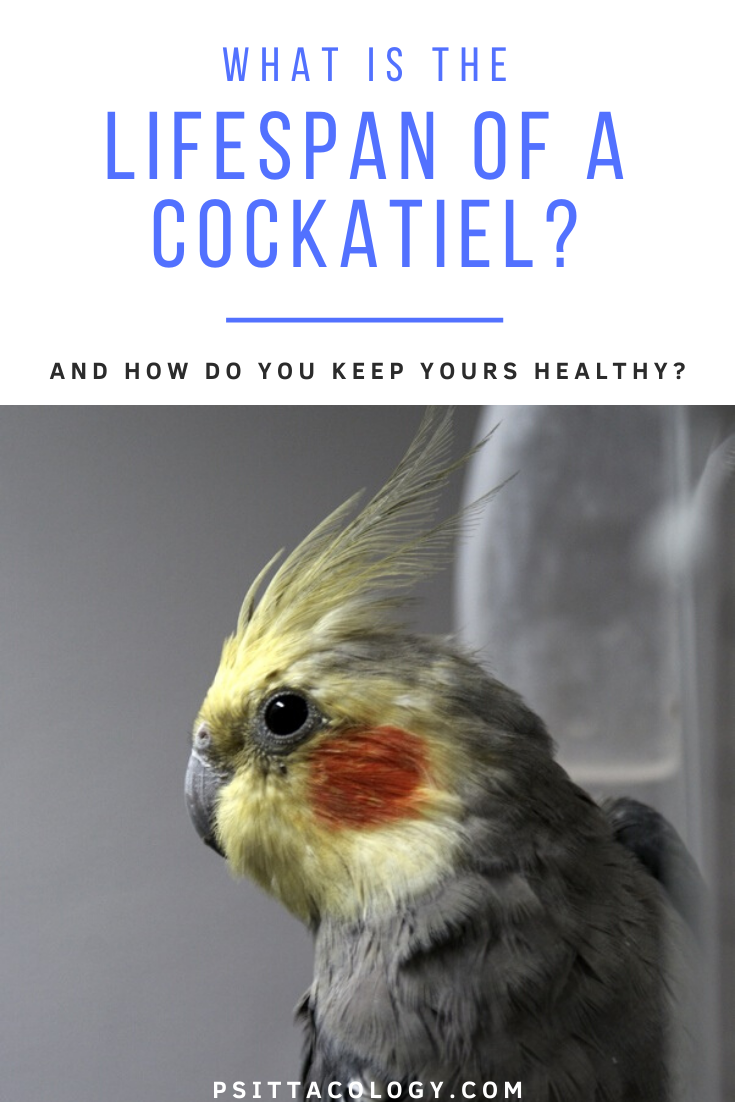
How long do cockatiels live in captivity?
As you could have guessed, captive cockatiels have a better life expectancy than wild ones. Before we discuss their actual potential lifespan, though, I’d like to stress that you are the one responsible for ensuring your cockatiel makes it to a respectable age.
They are entirely dependent on the care provided, so it’s incredibly important to do as much research as you can before you get your bird and to never stop wanting to learn once it’s in your care.
A well-cared-for cockatiel is a friend that can be around for a very significant chunk of your life. Up to 15 years should be very attainable given there are no genetic defects or unlucky accidents. In fact, even 20 to 25 years and up are not unheard of by any means for captive cockatiels!
Considering the above, if you’re thinking about buying a cockatiel right now, make sure that you can offer a stable home for years to come before adding one to your family.
I dove into the Guiness Book of World Records for this article and found out that their oldest listed cockatiel was named Sunshine, lived or lives in New Mexico and got the title in 2016 when he was 32. If Sunshine is not around anymore, he might have been overtaken by Buddy Walders the cockatiel, who was 31 in December 2018 and lived or lives in New Zealand.
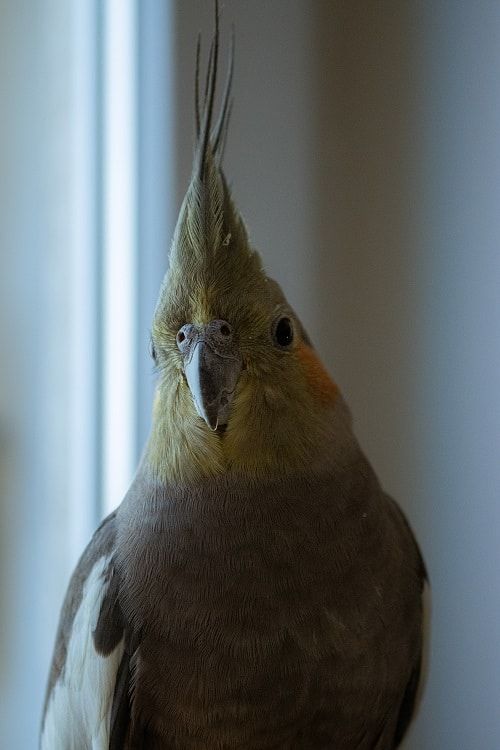
Lifespan of a cockatiel: contributing factors
Now that we’ve established the potential lifespan of a cockatiel, let’s move on to the more important bit: keeping your bird happy and healthy so it can actually live to those impressive ages.
There are many factors that influence a cockatiel’s health. As mentioned earlier some are genetic and you can’t do much about them, but many others are in your hands.
We will divide the factors that influence the lifespan of a cockatiel into diet, arguably the most important, and general care.
Diet
As with us humans, a proper diet is absolutely crucial in keeping a cockatiel happy and healthy. And as with us humans, diet is often unfortunately not approached the way it should. The myth that a cockatiel can thrive on a diet of only dry seeds is still very pervasive.
It’s true that seeds make up part of a wild cockatiel’s diet, but even the type of seed is different from the dry mixes that you can buy at the pet store. Some seeds will be fresh, others will be partly sprouted.
Then there are also grains, berries and anything the birds can pick off a farmer’s fields: they will eat anything available, much to the dismay of those who grow crops. Even unlucky insects might find their way into a cockatiel’s beak.
Is it absolutely impossible for a cockatiel to live off just seeds? No, some of the oldest birds survived on a diet like this. But the truth is that with a less fatty and more varied diet, the chances of a domestic cockatiel living a long life are simply greater. Their diet doesn’t need to be as calorie-rich as that of their wild counterparts either, because they expend less energy daily.
It’s handy to have a high-quality seed mix on hand and make it a part of your cockatiel’s diet. Specially formulated pellets can also be fed, although neither pellets nor seeds should make up the bulk of what’s in the bird’s food dish.
Mimic the natural diet by offering a wide variety (though one that is less calorie rich than wild ‘tiels would get):
- Fresh vegetables. Leafy greens are appreciated but you can try almost all veg. Have a look at the article on vegetables for cockatiels!
- Some fresh fruits. Apple, berries, mango, and more will work. Have a look at the article on fruits for cockatiels!
- Sprouted seeds. Try sprouting bird seed, legumes and more at home or buy sprouts.
- Treats (in moderation). Millet, honey seed stick and similar snacks can be especially helpful as motivation when you’re trying to train your cockatiel.
- Extras: some unsalted rice, pasta or lentils. Boiled egg, herbs, some garden weeds and even some wild grasses work well and can be used to keep the bird busy for hours.
- A mineral block is generally a good option. The use of cuttlebone has recently been debated but many bird owners still have one in their bird’s cage.
Keep in mind that clean water is of course also crucial to your cockatiel’s health. Ideally you should be offering more than one source, by going for both a dish and a bottle for example.
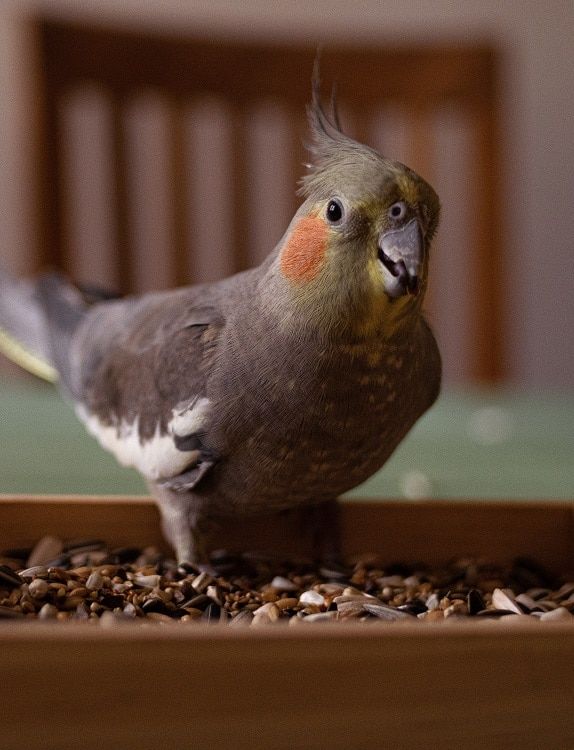
Care
Apart from a suitable diet, there are also some very important care requirements that should be kept in mind for any cockatiel. Accidents can happen easily and remember that birds are very sensitive to stress, among other things.
- Obesity. A varied diet containing lots of veggies is an important factor in making sure your bird doesn’t pass away prematurely from fatty liver disease and other obesity-related issues. However, you should also be making sure its cage is large enough and that it gets plenty of opportunities to fly and play. Exercise is important!
- Safety. I can’t stress enough how easy it is for a cockatiel to have an accident and be injured or even killed. An open window, an unsafe toy… scrutinize and cockatiel-proof everything before letting your bird close to it.
- Stress. This is a big bird killer, but a slow one that you might not notice. Make sure your cockatiel lives a relaxed life. No kids teasing it, plenty of socializing (or a friend) to avoid loneliness and lots of safe toys to avoid long-term boredom are all important.
- Air quality. Cockatiels, like all birds, have very sensitive respiratory systems. The room that your bird’s cage is in should be free of fumes at any time. These might not be what you expect: non-stick pans emit dangerous fumes, as do candles. Other common culprits are cigarette smoke, air freshener and perfume.
- Vet checkups. Your cockatiel should be checked by an avian vet at least when you get it and whenever anything appears wrong. Ideally, you should visit your vet semi-regularly for a check-up.
Remember, birds are very good at hiding that anything might be wrong and when you finally find out it might already be too late! Also have a bird emergency kit in your own home.
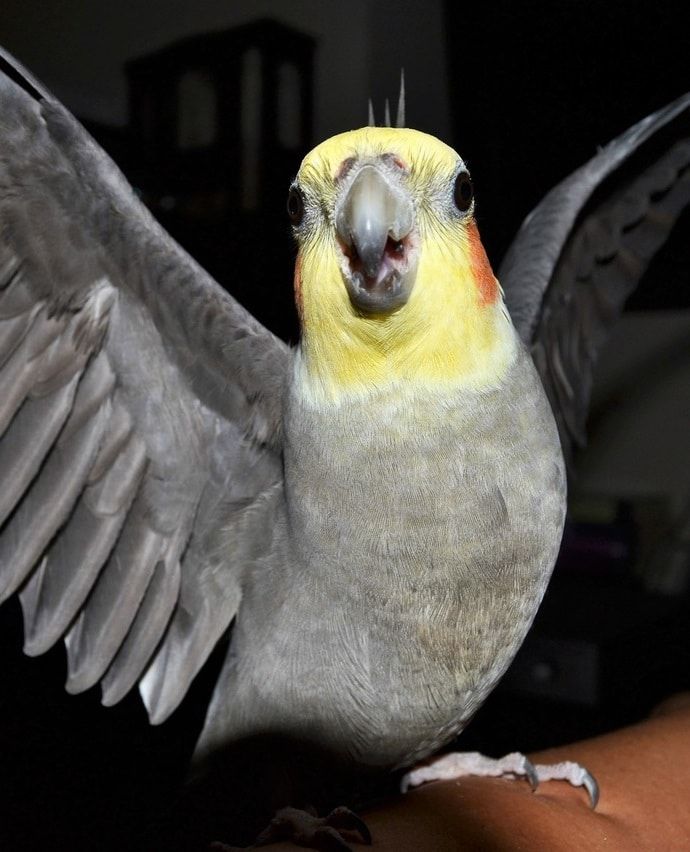
How old is my cockatiel?
If you already have a cockatiel and are wondering how much longer you might be able to enjoy its presence, it’s helpful to know how old the bird is.
When buying your ‘tiel, make sure to ask at the pet store, as they might be able to give you a rough estimate. Buying from a breeder gives you even more security, as they will know exactly when the bird hatched.
If your place of purchase was unhelpful in telling you anything of value about your cockatiel’s age, you might get lucky in rare cases if it’s ringed. The leg ring should generally have a code that you can use to figure out when the bird hatched. Additionally, if it’s a bird from a pet store, it’s usually relatively safe to assume that the bird is less than a year old.
If you adopted your bird from someone else or want to be more precise in determining its age but don’t have a breeder or ring to give you any pointers, you’re in a tough spot unless you’re a trained expert yourself.
If the bird is under two years old, there are some small clues that might help you out; above that it’s going to be next to impossible to pinpoint a cockatiel’s age.
- A young male cockatiel before its first molt will actually look like a female: its face will be grey instead of the typical yellow that adult males sport. This molt occurs after around six months.
- Young cockatiels will generally not be able to sing very clearly or at all (it’s mostly the males that produce tunes).
- Males won’t start showing courting behavior until they’re about six months old and females usually become broody for the first time at around a year.
- If you’re very experienced you might be able to use the appearance of the bird’s feet and face as rough indicators, though the differences are extremely subtle.
So, how long do cockatiels live? Well, quite a while with the right care, but whether yours reaches its potential lifespan is largely up to you!
If you have any more questions about the lifespan of a cockatiel or want to share your own experiences with these delightful mini cockatoos, don’t hesitate to leave a comment below.
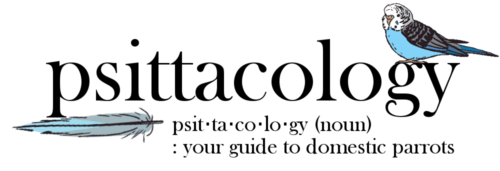
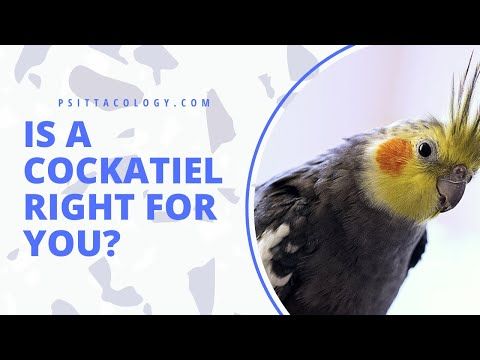
can a wild cockatiel baby & tame it
Could you clarify your question/comment? I’m not sure I understand 🙂
Mine is over 25 years old and stopped flying. One of his wings is missing feathers so I am assuming that’s the reason he doesn’t fly. Is it normal that old birds can’t fly?
It’s not the first time I’ve heard it. What are you feeding? If the diet and other factors are adequate then I’m afraid it is what it is, I suppose the feathers just lost their capacity to grow back in. An article on Northern Parrots states the following: “Some older birds lose feathers (like humans lose hair) but it’s not a fatal condition. When Lena first lost some feathers, I rushed to the vet, who reassured me kindly but said there was nothing to be done.”
Congrats on your bird making it to that age, that’s amazing 🙂
My cockatiel is 13 and I’ve noticed she hasn’t been able to grow back one of her long middle tail feathers this past year. It started growing but looked small and unhealthy, and she would just pull it out long before it finished growing. That happened twice, and it hasn’t come back since. Her diet is pretty good (about 60% pellets) and this is the first I’ve read online about this happening to other birds. Could this be a genetic thing? Or is it a sign that my cockatiel is getting “older”? Or both?
13 is still on the young side for this I’d think. You could always consider getting a basic blood panel done at the vet if it’s been a while since you’ve done that. But yeah, it could also be genetics, age or just bad luck I suppose!
He’s still here. I found him in Sept 1996, and he’s been here in the same house for 26 years. He gets both the pellets, and the cockatiel seed mix. I estimate that he must be at least 27 years old because he was already full grown when I found him, and he sang and could say his name too.
What a champ! Hope he gets around well. He’s the same age as me 🙂
Stopped flying / missing feathers for how long? As they get older, molts take a harder toll than when they were young ( just like when we get older everything is just a little harder). My oldest tiel was an amazing flyer till the end, but a heavy molt with several missing wing feathers would really both mellow her flying, and make her less agile. You could tell it frustrated her a lot. And a ‘ tiel who normally only flys say, from cage to you, etc never really develops the big beefy pecs my gal had. She really LOVED to fly, every morning when I came in she would be doing laps and figure 8s around the room, flying thru hoops we had at different heights, etc. The other birds would do some morning flying but they all settled down to just watch Kali. She’d finally have enough and then go shower and eat. She was a big bird my biggest tiel at her heaviest was 155 grams, and none of it was fat, she just was muscular and like to show off. Funny, the love of her life was my runt, who barely made 72 grams, and every morning when she made her laps, he would serenade her the entire time!
Our cockatiel, a male gray one, just now died. He lived a long long life, apparently for a cockatiel, as I read your articles and thoughts. He died at 34. Lots of different life stages, our Pavarotti the Bird “Birdie” finally ran into the end. Beautiful voice, but not an obnoxious noisemaker ever.
He ate pellets, and quite a lot of snack millet. A little scrambled egg, and chicken bits. He for sure ate more millet and pasta and rice than anyone recommended over the years. We were lucky or he was, or our measure of how much of the empty snacky starches is off. He worked over his plates of little colorful pellets, snapping them and making a mess of the area, but always was up for a half a teaspoon of the candy starches or a branch of millet. Green leafy veggies? Yeah, right is what he said. We tried all that we could! Chewed on a piece of coral I brought back from Hawaii these last couple of years. A flyer, cuddler, communicator. He and I developed a pretty short whistle greeting that he mimic’d from me when he was surprised I KNEW HOW TO TALK!! as a form of communication and and a way of showing off creativity. He never repeated the original or any other similar pattern he ever did. Like a whalesong, he always made some changes. Almost the last thing I got to do with him this morning was whistle that greeting and he snapped his eyes up, as far as he could as he lay dying, gently lying on a soft towel in my wife’s hands, where he spent as much time every day as he could. He opened the single feather covering over his ear to hear better while I talked to him in our whistle song. He moved his head feathers in response to his head scratches he loves and closed his eyes to slits, and opened them up to look at us when we changed scratches. That only lasted a little while before he did not react anymore.
When we brought our 1st daughter home, of 2, he immediately flew to her side on the bed and began making soft noises to her. He adopted her as his own, that moment and forever since. That was 22 years ago. The love and recognition and bond he kept over the years with her (and the rest of us, still, but secondarily) is so much like the movie it cracks us up. The movie Polly got it right. What a bird. We are still dropping some tears. What a bird.
Thanks for sharing! That’s beautiful. I’m glad you got to enjoy so many years with your friend 🙂
My Cockatiel, Jack just passed at 14 years old. He was a very picky eater. He would only eat his grain diet and would scream at me to replace it. He had a very big cage, but I have two dogs that would’ve hurt if he was out . He did alot of twurling around his perches with his wings out. He would only bathe in his water dish once a week. He talked constantly. When I got him. When I got him he was $65.00. Now they are 350.00 and up. Rehomed ones are cheaper. But I miss his early morning singing as well. Maybe if he would’ve lived longer with more fruit, bot wirh humans also…..we can’t force them. The dogs also are mourning his loss. They were freinds. It does hurt.
Thank you for sharing and very sorry for your loss, he sounds like a great little guy. 14 years is a pretty respectable age for a cockatiel.
Just don’t. Why would you when there are plenty of domesticated cockatiels that need caring for.
My baby will be 25 this July!
Amazing! I wish you many more happy years together ♥
My cockatiel used to come to my gym everytime with me 5 times a week and would fly around the gym to me counting him
He would fly ap and down the stairs to play
He would go into a pringle tin and get pringles out
He was so clever ,when i told him to go to bed he did
Thanks for sharing, that sounds amazing! ♥
How can you till the female ready to mate
As far as I know they can technically breed within their first year but I would wait until she’s at least 1.5-2 years old. If the male woos her to her liking with his dances and song, she’ll assume a typical breeding position and they’ll mate for a few consecutive days before starting to finish up work on their nesting spot. 🙂
Magic our cockatiel is 23 and apart from spending more time foraging in the bottom of his cage he’s as he was as a youngster
Thanks for sharing, I love reading about readers’ parrots with impressive ages! Hope you get many more great years together.
We had our cocktail for 32 years. We lost him just recently to a tumor under his left wing. ?
I’m so sorry for your loss, but congratulations as well, that’s amazing. That must have been one happy bird. 🙂 Hope you had great years with him.
My cockatiel will be 29 in July. He was hatched in my bedroom so I know how old he is within two days as he had two siblings that hatched around the same time. He has been fed a diet of organic pellets all his life and is offered greens every day and papaya every other day. Sometimes he won’t touch his greens or papaya for days or longer, but I still offer them. He seems to like beet greens the best, then red leaf lettuce.
My avian vet can not believe how old he is because he still looks great but he has a hard time flying now – it takes too much effort. His cage door is left open all day so he goes in and out as he pleases depending on what he wants to do.
Thanks for sharing, I love reading these stories! Let’s hope he smashes all world records!
Freddie, our cockatiel died a couple of years ago at the age of 30. We know exactly how old he was bc our neighbor bred cockatiels and gave him to us when we moved into our home. Freddie had a broken beak from flying into a moving ceiling fan when he was young. He could not eat normal cockatiel food but survived on a diet of canary seed. In fact, he would not eat the large seeds but only ate the small seeds that were easy for him to crack. He also had a broken wing from another accident. He could not fly but he got around well. Vet thought he had a stroke bc he could not stand on his perch any longer. We also could not get to his water and food. We decided to euthanize him and his ashes remain in our dining room with ashes of cats that also died over the years. Btw, vet said Freddie was actually a girl but we always talk of him as a boy.
Thanks for sharing! That’s an amazing age, he must have been very loved. ♥
my name is DIANE i have a cockatial named nigel the last 3 weeks he has not been flying and falling of his perch and just picking the sead of the floor he sleeps a lot of the time i have had him for 11 years not sure what to do any thorught woud be welcome
Hi Diane! You need to contact an avian vet in your area ASAP. Nigel sounds ill and probably needs medication. Don’t wait, call now to prevent it getting worse. Look for a vet that treats exotic animals or is specifically an avian vet.
My cockatiel died last night. ??
He was nearly 14 so not that old really. He started struggling to breathe & died before I could get him to the vet. I wish I could have saved him. I already miss him so much ???
I’m so sorry to hear that. 14 is a respectable age, as mentioned in the article, unfortunately sometimes even the best care can’t prevent underlying genetic issues or just plain old bad luck. Be nice to yourself and take some time to grieve. I hope you feel better soon.
My little buddy turns 26 in April, and we have never really done anything special with him, he’s had the same diet, same routine, same cage, for like the past 15 years and he’a still a happy guy, just a little grumpy. Last night he came out of his cage and hopped on my shoulder and let’s me pet him and give him scratches which he never lets me do. This morning i discovered a huge backup of poop near his butt and I’m not sure what to do. Also something else to add, he hasn’t been drinking his water.
Hey! Have you noticed any other unusual things? Diarrhea, inactivity, that sort of thing? Whatever the case, this is a three strikes and you’re out kind of thing – between three unusual things you’ve mentioned, I think it’s time for a vet visit. Especially with how old your bird is! Better safe than sorry 🙂
Hi, My female cocktail Prinzi died a month ago. I think because her buddy, ! Parakeet named Rani died. They were best friends. So now we have only one Cockatiel. His name is Poppi-Chewie and he is 26 years young. He is so happy being the only bird in the house and his favorite toys are boxes bags and paper. We have loved all our previous birds. so happy to still have him!
Thanks for sharing, so sorry to hear about Prinzi and Rani. I hope you get a lot more happy years with Poppi, he must be very loved 🙂 26 is a very impressive age already.
My cockatiel Scooter, aka “Scootie” died this past Saturday. He was 26 & 1/2 years old. My heart is broken, as he used to whistle “in the jungle” and do the cat calls when people would walk in the door. He was a grumpy old guy in his later years, but I loved that little guy so much. RIP Scootie bird, I’ll miss you! xoxo
RIP Scootie! Congratulations on him reaching such a respectable age though. You must be a great cockatiel parent.
Mitch is 23, had him since 1999, he has outlived both his companions, Bonnie who we had before him, but she was 12 when we got him after her partner passed, and Blue we got just after Mitch passed at 13. He has been living with budgies as companions since, always got on, never no problem. Funny thing in all the time I have had him and other birds, kept trying various fruits and vegetables with them all this time, and none of them have ever bothered with them, not even a nibble. All this time Mitch seems happy with just his mixed cocktail seed, and gets grumpy if he does not have a fresh millet sprig every day, plenty of fresh water, drinking and for bathing, his various mineral, iodine blocks and cuttlefish. Left the door of their cage open, so they could come and go and fly about when they felt like it. But this last few years Mitch does not really come out anymore to fly about, old age I suppose, he seems content to just climb on the top of his cage and sit. Fingers crossed I get more years from him, he has been with me half my life.
Thanks for sharing! Here’s to Mitch reaching 30!
Our cocatiel died a couple of days ago. He would have been 32 in a few months. We are heartbroken. He was 6wks old when we got him from a breeder. He had a huge personality, loved being out with the family, got along with the dogs, he spoke very clearly and had a big vocabulary. He was especially bonded with my husband. He clearly let him know when he wanted out to play. We miss him so much.
I’m so sorry to hear that 🙁 32 is amazing. Thanks for sharing, sounds like he had a fantastic family.
I had a Male Cockatiel named Sydney, I got him in 1996 at age 4mo., he was such a delight to be around. He was hand fed by the shop owner that weened him. On January 14, 2020 he died of a respiratory problem, not sure 🤔 of his age at that time. I squired a 2nd cockatiel, her name is Angel, she bites me too much and likes to chew on whatever she finds. She does like tapping her beak to the tune of “Shaving the Haircut to bits, that’s how the barber 💈 gets rich 🤑…..”, many times she’s just taps on whatever looks like a good object.
Thanks for sharing 🙂 hopefully Angel lives to a ripe old age like Sydney! Sounds like a character, as they all are.
I agree with you about that.
My tiel Chuck just passed. He was around 30 years old. I’m heartbroken. I pray his spirit is flying around happy and free in heaven now. Rest In Peace Chuck. I miss you already ❤️🕊
I’m sorry for your loss. I guess you came here to check whether 30 was a respectable age; it absolutely is, that’s quite exceptional. Good on you, sounds like he was very loved 🙂
Hi, My beautiful baby “Rocky” died recently. He was 14 years and 4 months old. An autopsy revealed he died from fibrosis/scarring of the liver and an enlarged heart from trying to to pump blood through a clogged liver. We were very diligent with his weight after discovering that he was a little overweight (110 grams) at about 5 years old. We then maintained his weight (94 – 98 grams) and diet (diet seed, and offered plenty of green vegies, carrots, peas, corn, egg and a small millet spray most days until the day he died. He was active and out of his cage for breakfast and flying around in the morning (1 hour) and the afternoon 1.5 to 2 hours every afternoon. We are grieving deeply as he was an integral part of our lives and we cannot understand why he died so young. But he did look like an old bird when he died. We have been told by the vet that there was nothing we could have done as it was probably genetic, however the vet did make us feel guilty because he claimed the fluctuation in his weight (as per above) was a significant factor. We have proper scales which I weighed him on regularly. He was toilet trained (mostly), highly intelligent, used to fly with me through the house (I was running of course), play hide and seek, spent many hours roaming around my office when I was working on the computer. We are absolutely devastated and cannot understand why he died so young
Hey. So sorry about Rocky, but thank you for sharing. Sounds like an absolute delight of a bird. I totally understand how hard it is to lose one.
Now, I’m not an expert on cockatiel veterinary care, but it doesn’t necessarily sound like his weight fluctuated that much with the way you described it. Genetics just really suck sometimes. 14 isn’t really “young” for a cockatiel – it’s already a very respectable age considering how many of them don’t make it past 5 due to bad husbandry. I don’t think you guys did anything wrong. The only thing I would have done differently would be to feed him a pellet-based diet rather than seeds, since pellets are lower in fat, but with all that veg he was definitely getting all the necessary nutrients.
Take a breather, put up some pics or maybe make a nice commemorative art piece if that’s your thing – I love framing their feathers in transparent picture frames (see here. And if you ever feel like opening your home to another cockatiel, I’m sure the perfect match is waiting somewhere in a rescue or shelter 🙂
My cockie Miki is 29 years old. He is still very much interested in mating, and I saw him on top of his mate this morning (she is 17). His little feet are still pretty good. He climbs on ladders and the cage ok, although a little more carefully. He eats mainly birdseed, but also greens, walnuts, boiled eggs, peas, and thin slices of carrots. I am amazed that they both like carrots if they are cut as thin as paper and warmed up under hot water.
Am I doing okay feeding them walnuts? They run over to the top of the cage when they see me bringing them fresh walnuts.
Thank you for sharing! Look at that, grandpa Miki is still a Don Juan haha. Walnuts are okay as long as you don’t overdo it. They’re high in fat, but yeah, the birds go nuts for them. Pun absolutely intended. Hope he sticks around for many more years 🙂
Mine died 8 days ago , I’m heart broken. I had him for 30 years and he must had been over a year old when gifted to me , he kept saying pepito so I called him pepito , He talked and used to ding the Andy Griffith show tune. One time I guess if mine left the door to the pool open and he s got out and was lost for 3 days, I kept looking for him whistling the same tune and he found me. I miss him so much haven’t stop crying for him. He was so intelligent. Never knew you can Mourn an animal so much.
Thank you for sharing, I’m so sorry about Pepito. As you can see in this post, 20 is a very respectable age for a cockatiel. You must have been doing something right. ♥
Just updating me post , I noticed a typo he was 20 years old; I wish he was 30 would had been easier an it was a Guest who left the door open .?on my behalf my eyes were full of tears when typing . Just sharing my pepito story , thanks
God bless you all and your pretty little birds that now fly around happily in heaven. 🙂